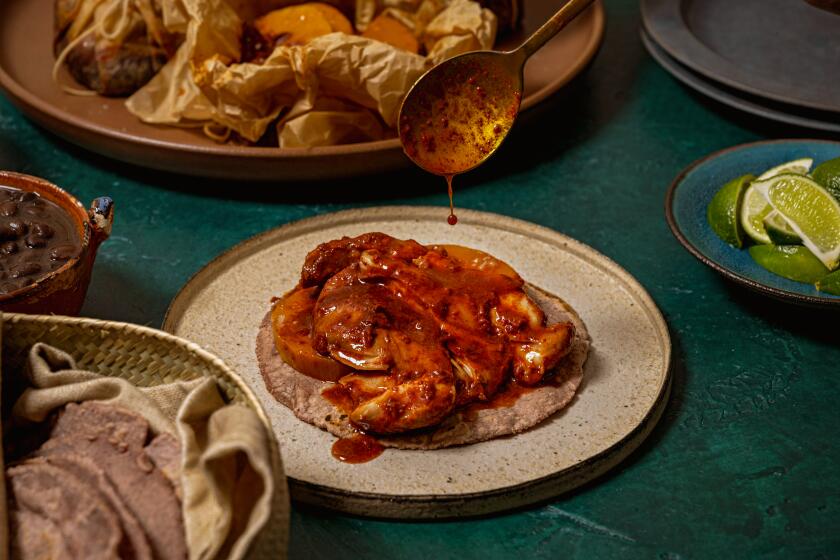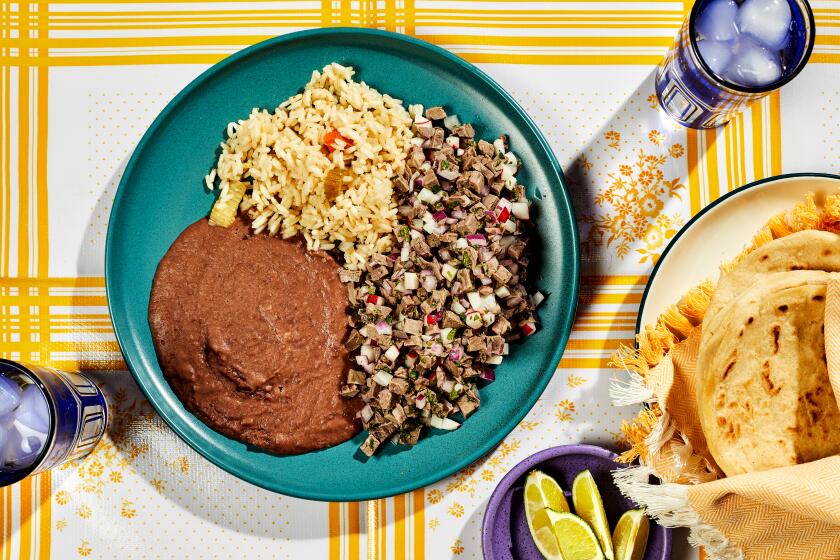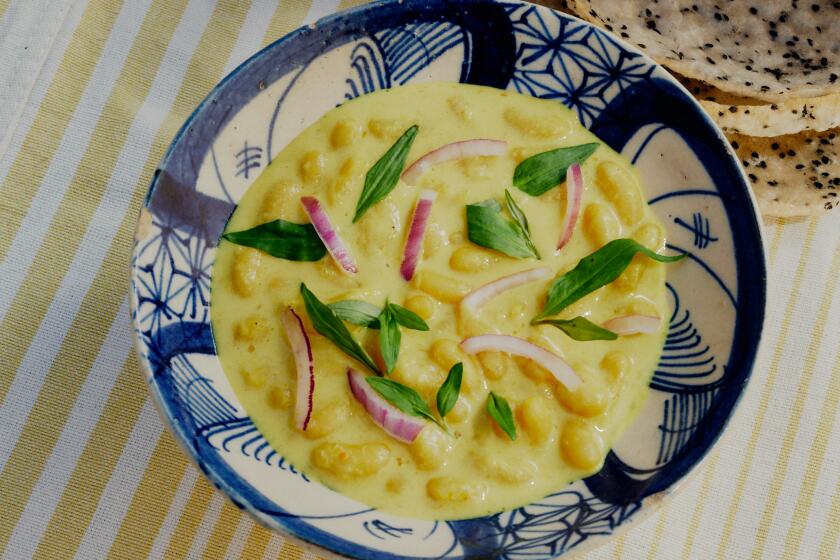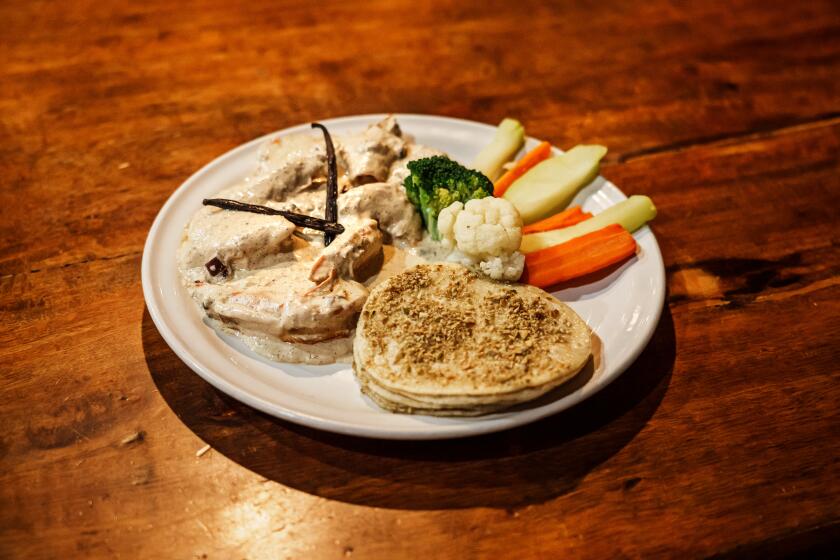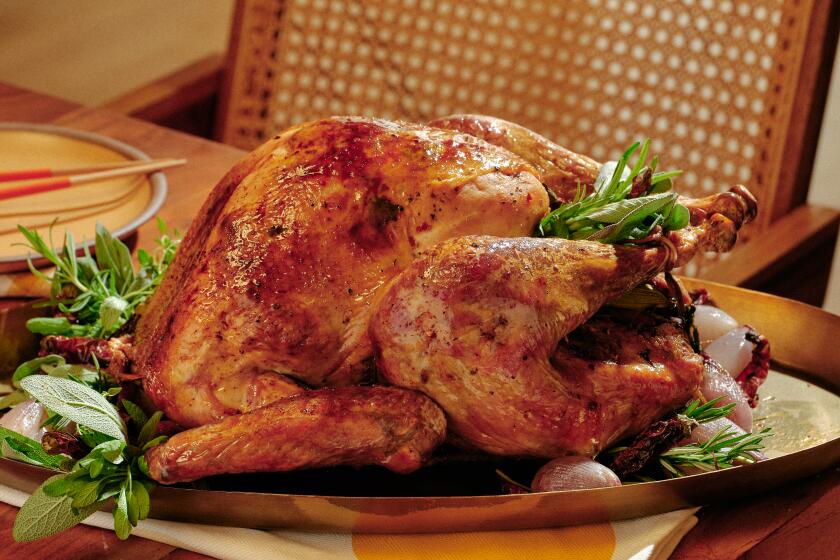Boeuf Bourguignon
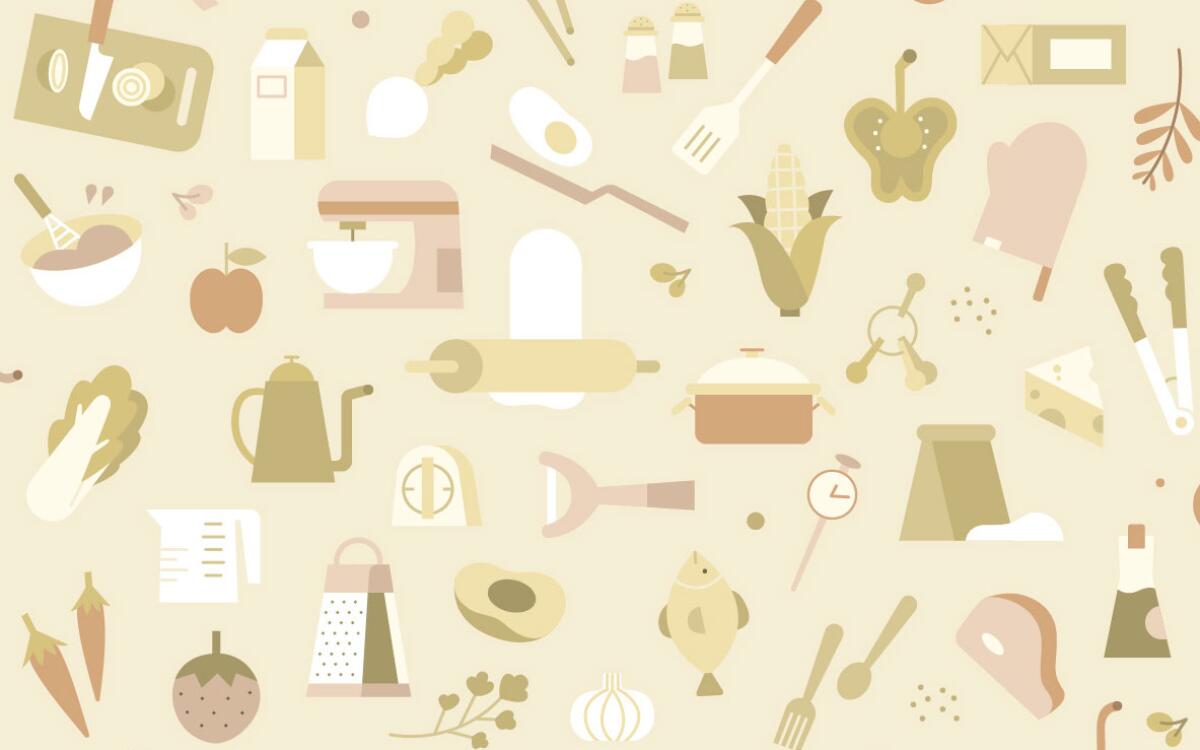
- Share via
Julie Powell was in a rut. Teetering on the brink of 30, living in a tiny apartment in a distinctly unglamorous outer borough of Manhattan, working at a government secretarial job she invariably describes as “soul-sucking,” she figured what her life needed was a good jump-start.
So last August, Powell began cooking her way through Julia Child’s monumental “Mastering the Art of French Cooking.” All 536 recipes, from Sauce Bechamel to Veal Prince Orloff. All in one year.
And because she is also a frustrated writer with three half-finished novels in the drawer, she though she’d write about it. Thus was born “The Julie/Julia Project,” an Internet diary, or blog, capturing one woman’s quixotic quest to shake up her life by making aspic.
Hosted by the Salon Web site, “Julie/Julia” is now the fifth-rated blog in its collection of more than 100. And, Powell notes brightly, that’s particularly impressive because all but one of the blogs ahead of her is pornographic.
“Julie/Julia” is kind of like a culinary version of “Bridget Jones’s Diary,” self-absorbed and foul-mouthed but in a sweet sort of way. Only in this case, all the snogging has been replaced by hollandaise. No, that comparison would probably make Powell cringe; “Bridget Jones’s Diary” is so two years ago.
Instead, let’s say “Julie/Julia” is an oddly compelling blend of twentysomething sitcom and reality show. At times it seems like a wacky episode of “Friends,” like something Monica might do if she actually had a sense of humor -- say back around season two.
At other times, it’s something straight out of “Survivor”: See Julie begin cooking some outrageous dish at 8 p.m. after working all day and lugging home four bags of groceries on the subway. Boeuf Bourguignon after midnight anyone?
And, there is even a soupcon of “Fear Factor” thrown in: Powell had never eaten an egg before she tackled Oeufs a la Fondue de Fromage.
Blogs such as “Julie/Julia” -- the name comes from “Web logs” -- began appearing in 1997; they are “private” journals written for the public, recording everything from the authors’ views on art or politics to the kind of minute detailing of neuroses that even the author’s mother wouldn’t want to know.
All it takes is an inexpensive piece of software and a willing host (Powell pays Salon $30 a year for her space).
Powell’s is not the first food blog, but it is one of the few that bears repeated reading. Most are devoted to “here’s what I cooked last night” or “here’s where I ate out last night.” What makes “Julie/Julia” different is not only the premise, but also Powell’s sense of humor about it. As with all the best blogs, what you may lose in professional polish, you make up for in unedited zest.
“Government drone by day, renegade foodie by night,” she describes herself in the first entry. “Too old for theater, too young for children, and too bitter for anything else.”
The birth of the blog was, she says, “an act of desperation -- my tendency to paint myself into a corner in order to force myself to do something.”
And so she began Aug. 26, with a menu of Biftek Saute au Beurre, Riz Naturel and Artichauts au Naturel avec Beurre au Citron (it probably won’t be a surprise that this was only the second artichoke Powell had ever eaten).
“That first [blog] was like standing on top of the high dive,” she says. “There was a definite flush of excitement. I posted it and it was out there and I couldn’t take it back. That was the top of the roller coaster.”
From there, it was on to the miracles of pate brisee, poulet saute, poached eggs and sauce supreme.
There have been disasters, of course (how funny would a blog be without them?). Like the time she invited her friends over for an all-aspic menu. What does one do with leftover chaud-froid? Or the night she made Homard Thermidor, or, more specifically, committed lobster-cide.
“I dreamed about it all night,” she writes. “Our sleep machine, the one we have by our bed to drown out the freight trucks rumbling past our apartment, was speaking to me: ‘Lobster killer, lobster killer, lobster killer....’ I was fully awake by dawn.”
And then there are Powell’s numerous food phobias. At various points in the blog, she confesses to loathing beans, olives, anchovies, salad, spinach, eggs and even fresh peas (“little green sacs of wet flour”). That’s to say nothing of the sweetbreads, veal kidneys and calves brains still to come.
At times, it has become all too much. “What is this thing I’m trying to do? How will I ever survive it? Is the “Julie/Julia Project” killing me?”
But there have been triumphs, too. The leeks in gratin, for instance: “I really cannot emphasize enough how good these leeks were,” she writes. “The eggy gratin, the leek-y leeks, the saltiness of the ham, all came together divinely.... This is the “Julie/Julia Project.” Boo-yah!”
She’s about halfway through the book, having mastered the art of souffles, quiches, bavarians, hollandaise, aspics and a half-dozen other things.
“The kind of thing I really am learning from J.C. is about really paying attention to the food as it cooks,” she writes. “Instead of depending just on time or heat, she instructs me, for instance, to watch for ‘a little pearling of red juice beginning to ooze at the surface of the steak’....
“You know what? She’s right. Those things really happen, and when I pay attention and my attentions result in a perfect medium-rare steak, I feel like I’m really beginning to cook.”
Remove the rind, cut the bacon into lardons (sticks, 1/4 inch thick and 1 1/2 inches long). Simmer the rind and bacon in 1 1/2 quarts of water 10 minutes. Drain and dry.
Heat the oven to 450 degrees.
Cook the bacon in 1 tablespoon of the oil over moderate heat in a 5- to 6-quart heavy, flameproof casserole until lightly browned, 2 to 3 minutes. Remove to a large bowl with a slotted spoon. Reheat the casserole until the fat is almost smoking before you cook the beef.
Dry the beef with paper towels; it will not brown if it is damp. Cook it, a few pieces at a time, in the hot oil and bacon fat until nicely browned on all sides. Add it to the bacon in the bowl.
In the same fat, brown the mushrooms over medium heat and set aside (if there is no fat left in the pan, add 1 tablespoon of olive oil to brown the mushrooms). Add the carrot and brown onion and cook until browned, 4 to 5 minutes. Pour out any fat.
Return the beef to the casserole with the vegetables and toss with the salt and pepper. Sprinkle on the flour and toss again to coat the beef lightly. Set the casserole uncovered in the oven for 4 minutes. Toss the meat and return to the oven 4 minutes more. (This browns the flour and covers the meat with a light crust.) Remove the casserole and turn the oven down to 325 degrees.
Stir in the wine and enough stock so that the meat is barely covered. Add the tomato paste, garlic, thyme, bay leaf and the bacon rind. Bring to a simmer on top of the stove. Cover the casserole and set in the lower third of the oven. Regulate the heat so the liquid simmers very slowly for 2 to 2 1/2 hours. The meat is done when a fork pierces it easily.
Meanwhile, heat the butter and the remaining 1 tablespoon of olive oil in a skillet over medium heat. When the butter foams, add the boiling onions. Cook, stirring the onions, so they brown evenly, about 5 minutes. When the beef is halfway done, add the onions to the casserole to finish cooking.
When the meat is tender, pour the contents of the casserole into a sieve set over a saucepan. Wash out the casserole (if you’re serving the stew from it at the table) and return the beef, vegetables and bacon to it.
Skim the fat from the sauce, if necessary, and simmer the sauce a minute or two, skimming off additional fat as it rises. You should have about 2 1/2 cups of sauce thick enough to coat a spoon lightly. If too thin, boil it down rapidly. If too thick, mix in a few tablespoons of stock. Taste carefully for seasoning. Pour the sauce over the meat, vegetables and mushrooms. Simmer 2 to 3 minutes, basting the meat and vegetables with the sauce several times. Serve from the casserole, or arrange on a large deep platter and serve, decorated with the parsley.
Get our Cooking newsletter.
Your roundup of inspiring recipes and kitchen tricks.
You may occasionally receive promotional content from the Los Angeles Times.










